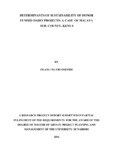| dc.description.abstract | Development partners as a way of reducing poverty in many parts of the world have envisaged dairying as a means to improving on the nutritional status and income generation from poor families. This has led to the implementation of lots of developmental projects in favour of dairying in the poor parts of the world by donors. Dairy farming is highly enriched with agro-ecological, political and cultural dimensions across countries, region and the vast continents. Dairy production trends and systems in many countries are influenced alot by policies put in place besides, climatic,technological and cultural factors. Policies interventions such as A.I, promotion of the marketing and consumption of milk and dairy products, provision of appropriate veterinary and extension services, milk import policies and institutional support to the dairy sector. Yet despite such major advancement in technology and favourable policies, most dairy projects still fail upon project termination. It is reported that failure rate of projects including dairy is 50% in Sub- Saharan Africa. Farmers in South Africa have increased their production significantly as a result change in policy on technology especially on feeding regimes, biotechnology, milking systems and housing. Kenyan dairy sector though considered the most advanced and a leading milk producer in Eastern and Central Africa produces an estimated 4 to 5 billion litres of milk annually from a total herd population of about 4 million dairy cows yet the success rate for donor funded dairy projects is barely 40%. Despite this problem, no study has been done to establish the cause of the termination of these donor funded projects especially on withdrawal of donor support on dairy projects a case of Malava sub-county,Kenya. This poses a gap that this study sought to fill through an investigation of the determinants of sustainability of the donor funded dairy projects, a case Malava sub-county, Kenya. The objectives of the study were: to determine how climate influence sustainability of donor funded dairy projects,to assess the extent to which technology influence sustainability of donor funded dairy projects, to evaluate the extent to which culture determines sustainability of donor funded dairy projects, and to establish the extent to which extension services determine, sustainability of donor funded dairy projects and a case of Malava sub-county, Kenya. The study adopted a descriptive research design. Stratified and purposive sampling techniques was used to come up with a representative sample size from 1,800 farmers. A mini study was conducted on 35 farmers out of the research target area. A return rate of 258 giving an 80% was reported. Data was analyzed using descriptive statistics with aid of SPSS in generation of results that was presented in form of percentages and cross-tabulation with Pearson chi-square for association indexes. The study established that; climate changes, landscape and terrain respectively srongly determined donor funded dairy projects. as revealed with p-values revealing a very strong significance in relationship within the first theme; within the second theme, rate of technology adoption and technologies available for adoption strongly determined sustainability of donor funded dairy projects revealing also significant p-values in this study. Within culture, results revealed that there was a significant relationship between the two variables level of association with alternative farming practices and gender roles posting high respectively. On extension services, a significant association was determined on level of farmer satisfation with extension services and types of services offered by extension officers respectively. On government policies on donor funded projects there was a relationship between policies by the government on donor funded projects and sustainability of donor funded dairy projects therefore revealing a strong association index. The study therefore recommends that the county government to develop strong policies on dairy development, enhance dairy trainings, set up a climate resilience training centre on climate change and to subsidize on issues of technologies like A.I, pests and disease control among others Lastly institutional implementation and subsequent monitoring and evaluation procedures set up . | en_US |



